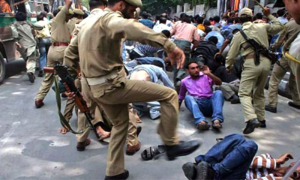The institution of courts is supposed to be the most powerful, where feeble look for justice and reach for protection. Those who have the honor to visit Pakistani courts are not surprised if “My Lord” fail to protect either inside or outside or in the precincts of the court. The trial scenes seen by us in movies and TV dramas are miles away from reality.
In the lower courts, the atmosphere is not much different from a fish market, and one should not be surprised when the warring forces find it a suitable ground to seek revenge. The incidences of firing and killing the eloped couple are a common phenomenon. Those who go to court, especially following some criminal cases remain tense till they reach back home.
In the last months, two persons were killed when their rivals opened fire on them on the premises of the session court in Lahore. The firing triggered panic among court staff, lawyers, and visitors who ran to save their lives. The victim suffered nine bullet wounds and succumbed to injuries in hospital.
The act of “targeted killing” in the court premises raises fingers on the security measures. The ceremonial security at entry and exits of court premises through deployments of cops, installation of walkthrough gates, and use of metal detectors may be an impediment for the common citizen but proves futile for those who dare to defy them.
Such incidents are common, and we have a grim history. Perhaps the worst was when in March 2014, 11 people were killed in an attack at a court in the Pakistani capital, Islamabad. Two suicide bombers detonated explosives inside the courtroom. As the crowd gathered on the site, two gunmen burst into the yard and opened indiscriminate firing. A judge and several lawyers were among those killed, and dozens were wounded. Later a terrorist group called Ahrarul Hind claimed to have carried out the attack.
Interestingly, we are not the only country that has an unsafe environment. Our neighbors also share the same lineage. Recently, in July 2023, the inmates of Tis Hazari court in Delhi witnessed firing. In June 2023, gangster Sanjeev Jeeva lost his life when 8 bullets pierced his body in a Lucknow court.
The breaking of the law is not restricted to the criminals; the torch-bearers of the law often resort to extra-judicial measures. In the past and even now, persons were apprehended on motivated grounds in the remits of the court. Later, the High Court did declare it illegal, but no action has so far been taken against anybody for doing the illegal act and perhaps will never be.
The courts have their own novel culture. The black coats dominate, and rightly it is their kingdom. The triumphant Lawyer movement following Musharraf’s action against Chief Justice Iftikhar Chaudhry instilled a sense of extra power in the minds of the lawyers. Judges and lawyers combined, sadly, fail to create a safe environment in their domain.
While in Police service, I had the honor to present myself at the mercy of the court. Thankfully, I was spared but did hear these remarks, “You will go home directly from here”. The criminals and the powerful enjoy apathy, and the virtuous and the poor pray for mercy. Realistically, in the end, influential succeed.
Another interesting phenomenon is escaping criminals from the court. This happens even after the judge announces the verdict. Sensing the likely outcome of the hearing, a crowd is created around the offender, and as soon the verdict is passed before the police lay hands on him, he is whisked away by his sympathizers.
Often, there is tacit approval of the police for a few pieces of silver. One such famous incident was the escape of Rashid Rauf, a Briton national, in June 2007. He was suspected of a plane bombing plot. On his way back from a court hearing in Islamabad, police let his uncle drive him back to jail, giving him an opportunity to escape.
Coincidentally, here too, we are not the only country. In New York, two convicted murderers escaped from Elmira State Penitentiary in July 2003, though both were recaptured in 2 days.
In another incident, a criminal named Brian Nichols escaped from the Fulton County courthouse in Atlanta by overpowering a guard. He then murdered a judge, a court reporter, a police officer, and US Customs Agent. Afterward, he held a woman hostage for a night in her own home. He allowed her to leave to visit her daughter. Once she was released, she called the police, and he surrendered peacefully to the police.
I wish no innocent ever would go to Bakshi Khana – a place where prisoners under trial are kept before presenting in the court. Once, I visited the place and was astonished to see the atmosphere. You name the evil, and that was there. The prisoners were facilitated to the fullest against a few coins. Were the bosses ignorant? Certainly, they cannot be.
Can our courts be made safe? Certainly yes. But only if conduct codes be the unwavering law, security responders are the shield of reason, and spaces be the architects of tranquility.























